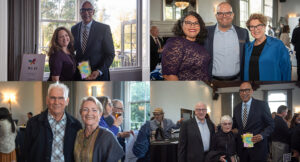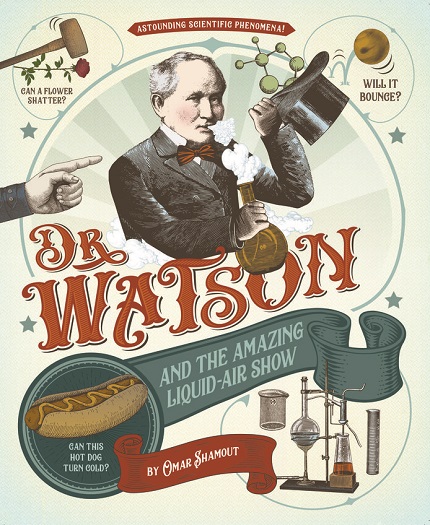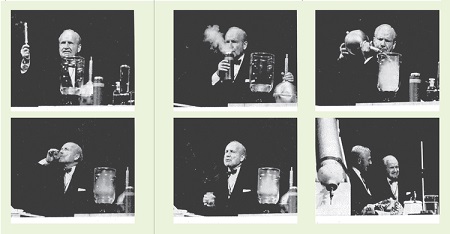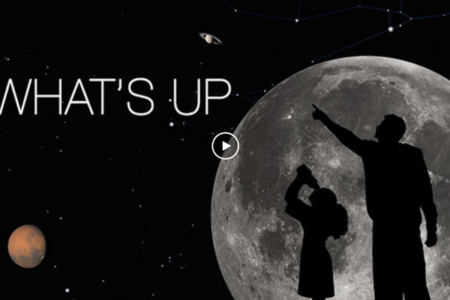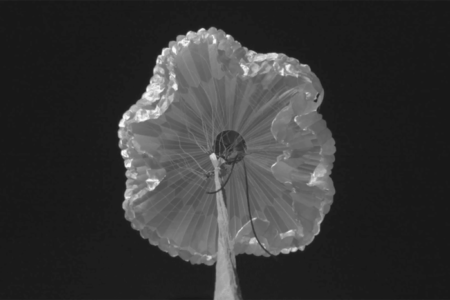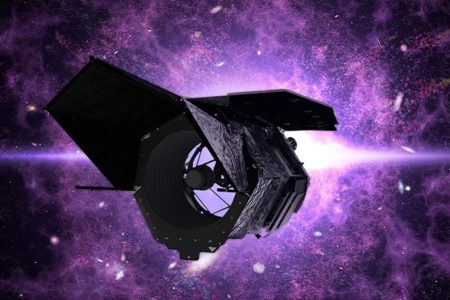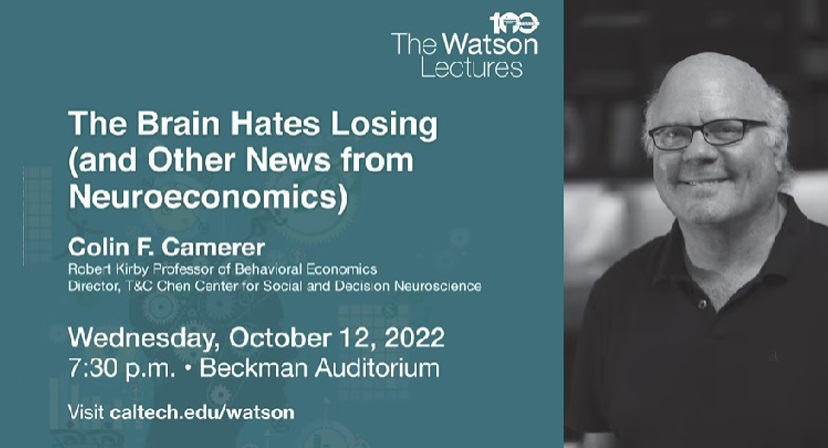
This week, one of Caltech’s premier public outreach events marks its centennial. At 7:30 p.m. PDT on October 12, Colin Camerer, the Robert Kirby Professor of Behavioral Economics and director of the T&C Chen Center for Social and Decision Neuroscience, will launch the 100th anniversary season of the Earnest C. Watson lecture series with a talk entitled “The Brain Hates Losing (and Other News from Neuroeconomics).” Camerer will discuss how aversion to loss and our emotional response to such events can explain aspects of stock trading, sports, and politics, as well as how measurements of brain activity can improve decisions and cooperative outcomes.
Camerer will be followed on November 2 by Magdalena Zernicka-Goetz, Bren Professor of Biology and Biological Engineering, speaking on “The Dance of Life: How Do We Become Ourselves?” Claire Bucholz, assistant professor of geology, will give 2023’s first lecture on January 18 with “When Earth Breathed Deeply,” in which she will discuss how our planet’s atmospheric oxygen levels have increased by many orders of magnitude over time, profoundly affecting biological and chemical cycles on Earth’s surface.
Watson Lectures are always free and open to the public, and they can be viewed via live stream on caltech.edu/watson or on Caltech’s YouTube channel. This season’s talks will also be presented in person at Beckman Auditorium on Caltech’s Pasadena campus.
The Watson Lecture Series began in 1922. Caltech physicist Earnest C. Watson became one of the first presenters when he stood in front of a packed lecture hall to deliver his famed “liquid-air” demonstration. The professor would open a bottle of air that had been cooled to more than 300 degrees Fahrenheit below freezing, and the contents would appear to “boil” out of the bottle and engulf Watson in white fumes.
The evocative demo grew into series of public talks called the Friday Evening Demonstration Lectures, which kept members of the community up to date on the latest in science by repeating for them the physics demonstrations done for first- and second-year Caltech students. The first lectures took place in 201 East Bridge, now known as the Feynman Lecture Hall, but in 1964 were relocated to Beckman Auditorium. In 1972, two years after Watson’s death, the Institute recognized him by renaming the series in his honor.
The Watson series has always been focused on benefiting the public through education and outreach. The October 12 press release announcing the first-ever demonstration eight days later, read: “Realizing the general public’s interest in the Institute and in the results of science, the Institute has decided to invite the public to attend these lectures. Modern points of view will be emphasized and some of the great epoch-making experiments will be reproduced.” So many people showed up in the early years that lectures often had to be repeated in the same evening to accommodate the crowds.
Early speakers in the series also included Charles Galton Darwin, a visiting professor and grandson of Charles Darwin, whose topic was gyrostats; Arnold Sommerfeld, a distinguished physicist from the University of Munich, who offered a lecture demonstration on oscillations and resonance phenomena; and Caltech’s own Arnold Beckman, then an assistant professor of chemistry, who frequently presented about ionic theory and atmospheric gases.
Over time, the Watson lectures ventured into fields of scientific research beyond physics. Linus Pauling, the late Nobel laureate and Caltech professor of chemistry, spoke on the nature of chemical bonds. Harry Bateman, the late Caltech professor of mathematics, physics, and aeronautics, gave a presentation about the humorous side of mathematics. And, in more recent years, the Watson Lecture Series has featured such Caltech luminaries as Kip S. Thorne, the Richard P. Feynman Professor of Theoretical Physics, Emeritus; Ken Farley, the W.M. Keck Foundation Professor of Geochemistry and Mars 2020 project scientist; and Dianne Newman, the Gordon M. Binder/Amgen Professor of Biology and Geobiology.
For more information, please visit events.caltech.edu. No advance registration is required for the Watson Lectures, but you may sign up for event reminders here.
A playlist of the recent Watson lectures available to watch on YouTube can be found here. The Caltech Archives collection contains video recordings of Watsons dating back to the 1980s and audio recordings dating back to the 1970s.
For more information, contact the Caltech Ticket Office via email at events@caltech.edu or leave a message at (626) 395-4652. Please allow 48 hours for a response. No reservations are necessary to attend.
